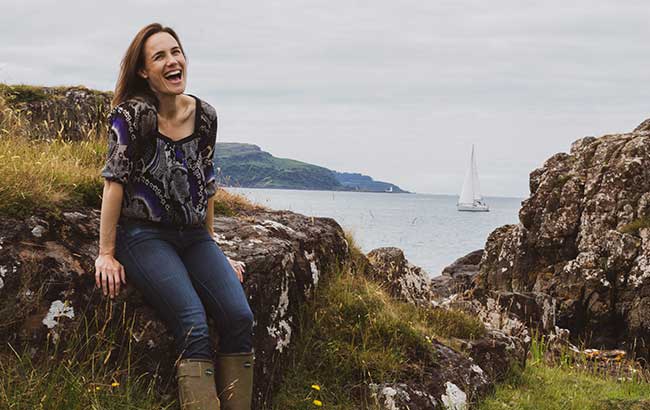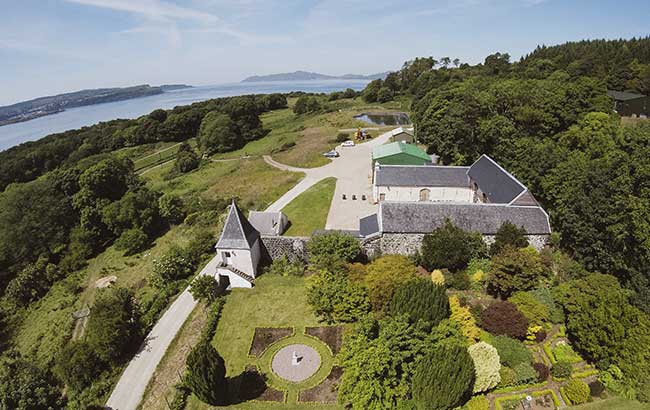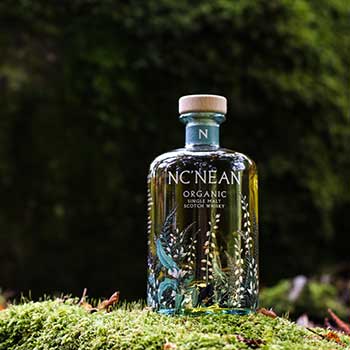The big interview: Annabel Thomas, Nc’nean
With her zeal for sustainability and transparency, Annabel Thomas of Scotland’s Nc’nean distillery is blazing a trail in the Scotch whisky industry – and determined to do things her way.

*This feature was originally published in the December 2021 issue of The Spirits Business magazine.
Urgent calls for action to save the Earth from global warming have risen to a clamour in recent years. While many brands are only now giving serious consideration to their carbon footprints, sustainability has always been of top priority for Annabel Thomas.
The CEO and founder of Nc’nean left a management consulting career to pursue her dream of running a Scotch whisky distillery – and in just a short space of time has become a true leader in the field.
Thomas was invited to speak on a panel at this year’s United Nations Climate Change Conference (Cop 26) in Glasgow, Scotland, in November, where she shared the stage with Becky Paskin, writer, presenter and Our Whisky co-founder, Karen Betts, outgoing CEO of the Scotch Whisky Association, and Nicola Sturgeon, first minister of Scotland.
“The idea was to highlight an industry that is so iconic to the country that Cop 26 was being held in, and provide some lucidity on the challenges it faced, but also inspiration that the industry is moving in the right direction,” Thomas explains.
When you look at the sustainable achievements of Nc’nean in a short space of time, it’s clear why she was the perfect choice for the panel. It’s been a historic year for Nc’nean, which is named after an ancient Gaelic goddess. In July, the Highland producer became the first whisky distillery in the UK to achieve net zero emissions – a huge feat for a site that has only been distilling since 2017.
Nc’nean’s 2020 carbon footprint was the first to be verified by Environmental Strategies as net zero in the UK, meaning emissions from Nc’nean’s production were less than the amount removed from the atmosphere. The Scotch whisky industry has set its net zero target for 2040, meaning Nc’nean reached this status 20 years ahead of the wider category’s goal.
However, Thomas says there is still a lot of sustainable improvement that can be done at Nc’nean.
“It’s a journey, and we’re still on that journey,” she says. “The things that we were focused on at the beginning were the big picture – capital investments that we needed to create a green distillery.”
These targets included installing a biomass boiler rather than an oil boiler; being mindful of where the organic barley would be sourced from; having a closed-loop water-cooling system on site; and being able to dispose of waste products on Thomas’ parents’ farm, where the distillery is located.
“But, of course, as soon as you get into a business, you start to realise all of the other challenges, and that we had to tackle them,” Thomas adds. “We are still trying to tackle some of those as we go along.”
One example Thomas gives is the use of caustic soda, commonly used for cleaning distilling equipment.
“That’s not something we had spent any time really considering before we started distilling and over the past four years, we’ve started to find alternatives to try and reduce our use of it,” Thomas notes.
Caustic soda is a highly alkaline chemical, Thomas explains, and it also uses a lot of energy to produce.
“Big distilleries get this in tank-loads, but we are relatively small, and we get it in little drums,” she adds. “Those drums can’t be recycled because caustic soda is a chemical and, for example, it can’t go on your skin because it burns. So it creates waste, and ultimately ends up in the environment however you dispose of it.”

Eco-friendly alternatives
Thomas’ team has been researching eco-friendly alternatives, and progress has been made.
Nc’nean has managed to halve its use of caustic soda by using an enzyme used in the beer industry, but never before in the spirits sector.
“We trialled it on all of our equipment but it didn’t give sufficient cleaning in the mash tun. It is used in other parts of the process, like the wash still, where it’s extremely effective,” says Thomas.
“It’s a win-win really because it not only has none of those harmful effects we just talked about, but it’s much better for our team to work with because it’s not highly alkaline or corrosive like caustic soda is.”
Ultimately, Thomas would like to eradicate the use of caustic soda at Nc’nean altogether – “although that’s probably not our highest sustainability target”, she adds.
Thomas explains that to be certified as a distillery with net zero emissions, Nc’nean had to measure everything it does as a business both on site (scope one and two) and through the supply chain (scope three).
“We have a very, very low carbon footprint on site in the distillery itself – 26 tonnes – and we offset what remained, and that’s why we’ve been able to declare ourselves net zero,” says Thomas. “But for the whole of our supply chain, we still have a lot of emissions, and we have to tackle them – and that is where our current priority lies in terms of carbon reduction.”
This includes, but is not limited to, the barley, refill schemes, working with farmers to measure and reduce their carbon footprints, and packaging.
Unsurprisingly, when Nc’nean launched its inaugural single malt Ainnir last year, the whisky was bottled in 100% recycled clear glass, reducing each bottle’s carbon footprint by 40%. Only 1,320 bottles were released of the unpeated, no-age-statement expression, which was bottled at cask strength (60.3% ABV).
Auctioning Nc’nean
While the first 10 bottles were sold at auction to raise money for five charities, including The Drinks Trust, the remaining 1,310 sold out within 36 hours of going online.
“It was a very strange time to launch our whisky because I’ve been working on the distillery since 2013, we’ve been distilling since 2017, and we never imagined that we would be launching in the middle of a global pandemic,” Thomas says. “In February 2020, we’d written this marketing plan, but we had to rip it up in March because it was all about events and bars, and, of course, all those things were now closed. So we were kind of doing our best in this completely new environment, really not knowing what to expect at all.”
The auction idea had been intended to give back during the pandemic – “we all remember what it felt like in mid-2020, like the world was ending” – but in a surprising turn of events, it drummed up huge demand for Nc’nean.
Bottle number one set a new world record after fetching £41,004 (US$54,650) during the Whisky Auctioneer sale, quadruple the previous record held for a first bottle from a new distillery to be sold at auction. The combined sale of all 10 bottles exceeded £92,000 (US$122,575), including a contribution of £8,560 (the 10% buyers’ commission donated by Whisky Auctioneer).
“It’s put us on the whisky map in a way that we weren’t expecting, and that’s what really drove the demand, which is fantastic but not at all expected,” Thomas adds.
Although a limited number of Ainnir bottles were released, Thomas doesn’t refer to the bottling as a limited edition, which is all part of her goal to be as transparent as possible about the liquid in the bottle.
“Every single malt is a batch – it’s just no one is transparent about it,” she explains. “So we just like to be really transparent and that’s why we put the batch numbers on the bottle, and then you can go on to our website and find out as much information as we’re allowed to disclose about what’s in that batch. So we are just being open with consumers about how single malt is made; it’s not meant to be a limited edition thing.”
New releases
Most recently, Nc’nean launched a whisky series called Quiet Rebels. The debut release is called Annabel, named after Thomas, and consists of 4,504 bottles. The whisky was matured in a mix of ex-Tokaji barrels and ex-Bourbon barrels.
Following bottlings in the range will be curated and chosen by people from Nc’nean’s 15-strong team, and will, most likely, be single malts.
“I don’t think blended whisky is really our bag – not because I have anything against it, I think it can be amazing and what people like Compass Box do is absolutely fabulous, but central to our principles is that everything is made as sustainably as possible,” Thomas explains.
“If you start introducing blends, you’re getting stuff from elsewhere and it’s not going to be low-carbon, it’s probably not going to be organic, and so on and so forth. So from that point of view, keeping everything within our distillery from a whisky point of view is really important.”
Unfortunately, Nc’nean has not been spared from the supply chain crisis, resulting in delays to new launches.
The launch of Quiet Rebels had to be pushed back by about a month and a half because the bottles didn’t arrive on time. Packaging materials are “very hard to get hold of at the moment”, Thomas says.
In a bid to mitigate the issue, Nc’nean is having to buy more and further in advance, “which everyone is doing, and that actually exacerbates supply chain issues, so it becomes a little bit of a vicious circle, I fear”.
“We are constructing a bottling building and warehouse, and building materials at the moment are extremely challenging in terms of availability,” she adds.
“And steel, wood and timber prices are going up all the time. There’s not much we can do about it apart from buying forward where we can and adapting where we can.”
Future releases are on the horizon, however.
“We’ll have another seasonal release that will come out in spring. We’ll have single cask releases and a portfolio of single malts structured like that. We’ve got lots of interesting things going on in the warehouse,” she assures.
The botanical spirit that was brought out before there was any Nc’nean whisky of age will also “continue to be part of our core range”.
Export markets
Export markets are growing nicely for the brand too, and Thomas has plans to launch in Sweden and “hopefully Poland” in early 2022. Nc’nean is currently available in France, Germany, Belgium, the Netherlands, Italy and Denmark.
“We’ve intentionally focused on Europe so far. It’s on our doorstep, and also from a low-carbon footprint point of view, we’re better to send our products closer to home. We have to decide where we go next, the US or maybe Asia, we’ll see.”

At present, the distillery is running at a production capacity of 96,000 litres per annum, which Thomas estimates contributes to around 700 casks, depending on size. While there is room to scale up, such as by operating the distillery at weekends, or for longer hours in the week, Thomas is not entirely sure this will be the way to go.
“I don’t want my team to be working unsustainably, so we’re probably not going to do that,” Thomas says, adding: “We are adding another wash back at the moment, so that will give us the possibility to expand a bit further, but exactly when we do that is to be determined. I think we can have an impact in spite of being absolutely tiny because we’re not even selling anywhere near what we produce at the moment.”
Ensuring staff are able to maintain a happy work-life balance will be of top priority should any capacity expansion plans materialise. Thomas also sees this as the way to attract not only a new generation of workers to the Scotch industry, but a new audience of consumers.
“If you want to attract new drinkers, then just employing a whole load of the old school Scotch brigade is not going to help you achieve that,” Thomas insists. “One of the wonderful things about the team at Nc’nean is that it’s very diverse and it’s full of a lot of people who’ve not worked in Scotch before. That gives us a different perspective on life, and in particular on whisky.”
The distillery recently became certified as a B Corporation, joining just over 600 businesses in the UK.
Related news
Cocktail stories: Speed Bump, Byrdi
